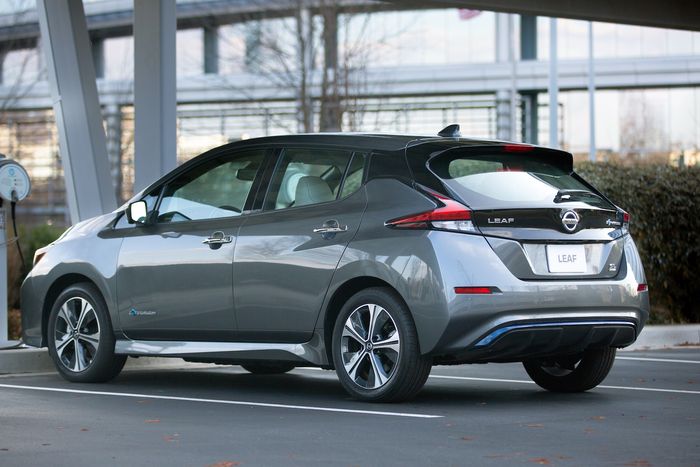The electric car market is constantly growing with new entries, but many of them are expensive luxury vehicles. However, that doesn’t mean finding a reasonably affordable EV is impossible. Such options on the lower end of the pricing spectrum are the Kia Niro EV and Nissan Leaf.
2022 Kia Niro EV
The Kia 000270, -1.03% Niro EV is an electric SUV with a lot going for it, and it recently became available in all 50 states. That makes it more competitive with the stalwart Nissan NSANY, +0.79% Leaf. Pricing starts at $39,990 before any federal or state incentives.
Kia Niro EV highlights
SUV versatility: These two EVs have similar interior space, but the Niro EV is a bit more versatile. The rear seats can fold flat in the Niro EV, but not in the Leaf. That means you can open up the cargo area of the Niro EV for up to 53 cubic feet of space, compared with a maximum of 30 cubic feet for Leaf.
239-mile range: The Niro EV comes standard with an impressive electric range of 239 miles. That beats the Leaf with a standard 149-mile range, as well as the 226-mile range with the Leaf Plus.
Excellent warranty: The Kia Niro EV has an outstanding warranty. The 5-year/60,000-miles basic warranty and 10-year/100,000-mile powertrain warranty is much more generous than the Leaf’s warranty.
See: How much does it cost to charge an electric car? We do the math
2022 Nissan Leaf

The Nissan Leaf
Nissan
The Nissan Leaf is the original mass-market EV, and it’s still a good value in electric cars. Now in its second generation, the Leaf is a practical hatchback that happens to be electric. Pricing starts at $27,400 before any tax incentives kick in.
Nissan Leaf highlights
Value pricing: The Nissan Leaf has a considerably lower starting price than the Kia Niro EV. Granted, that’s partially because the standard Leaf has a shorter range than the Kia by 90 miles, but even the longer-range Leaf Plus is quite a bit cheaper than the Niro EV.
Low ownership costs: The Nissan Leaf is a consistent winner of our 5-Year Cost to Own award in the Electric Vehicle class. That’s due in large part to its low sticker prices but reasonable maintenance and insurance costs, as well as manageable depreciation, which make it an affordable car to live with.
Two battery options: If you can live with a 149-mile range, you can save money by getting the more affordable and slightly more efficient 40 kW-hr battery in the Nissan Leaf. If you’re willing to pay a little extra for more range, the 62 kW-hr battery in the Leaf Plus gets up to 226 miles of range.
Related: This is the cheapest electric car, and it just got an update
Similarities
Similar interior space, similar performance and range numbers (with Leaf Plus), similar charging times
Don’t miss: Car trouble? Blame the rats.
Conclusion
The Kia Niro EV has a longer range and warranty than the Nissan Leaf, but the Leaf is the value choice. If you’re looking for better range and SUV versatility, go with the Niro EV. However, the Leaf is a better bargain if you want a good value and lower ownership costs.
| 2022 Kia Niro EV | 2022 Nissan Leaf | |
| Starting Price | $39,990 | $27,400 |
| Popular Powertrains | ||
| Engine | Electric motor w/ 64 kW-hr battery | Electric motor w/ 40 kW-hr battery |
| Horsepower | 201 hp @ 3,800 rpm | 147 hp @ 3,282 rpm |
| Torque | 291 lb-ft @ 0 rpm | 236 lb-ft |
| Transmission | 1-speed automatic | 1-speed automatic |
| Fuel Economy | 112 combined MPGe | 111 combined MPGe |
| Range | 239 miles | 149 miles |
| Also Available | 62 kW-hr battery | |
| Specs | ||
| Basic Warranty | 5 years/60,000 miles | 3 years/36,000 miles |
| Powertrain Warranty | 10 years/100,000 miles | 5 years/60,000 miles |
| NHTSA Overall Safety Rating | 5 stars | N/A |
| Max Seating Capacity | 5 | 5 |
| Wheelbase | 106.3 inches | 106.3 inches |
| Overall Length | 172.2 inches | 176.4 inches |
| Width | 71.1 inches | 70.5 inches |
| Height | 61.8 inches | 62.0 inches |
| Turning Diameter | 34.8 cubic feet | 36.1 feet |
| Headroom, Front | 40.1 inches | 41.2 inches |
| Headroom, Rear | 37.7 inches | 37.3 inches |
| Legroom, Front | 41.7 inches | 42.1 inches |
| Legroom, Rear | 36.0 inches | 33.5 inches |
| Shoulder Room, Front | 56.0 inches | 54.3 inches |
| Shoulder Room, Rear | 55.1 inches | 52.5 inches |
| Cargo Volume | 18.5/53.0 cubic feet | 23.6 cubic feet |
This story originally ran on KBB.com.





